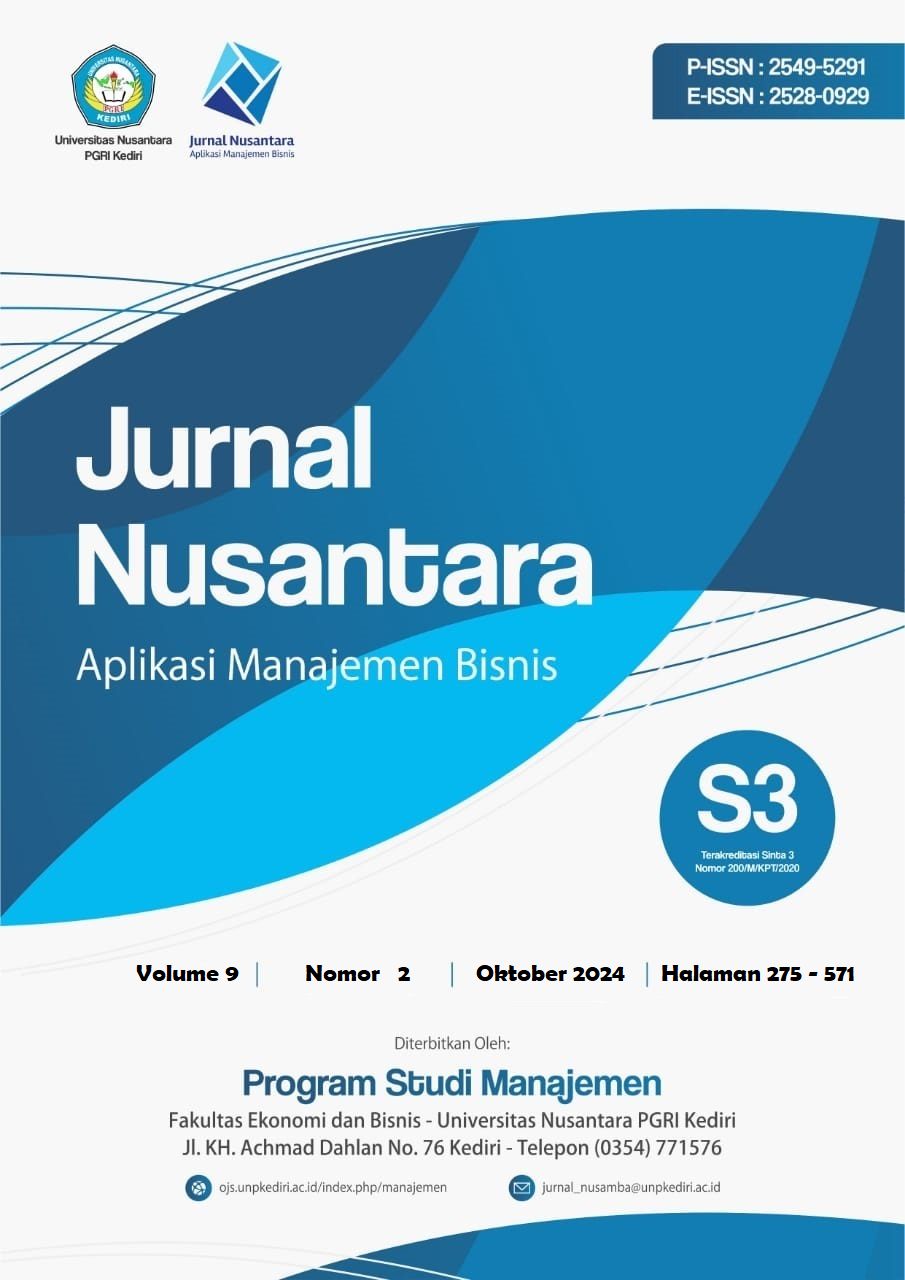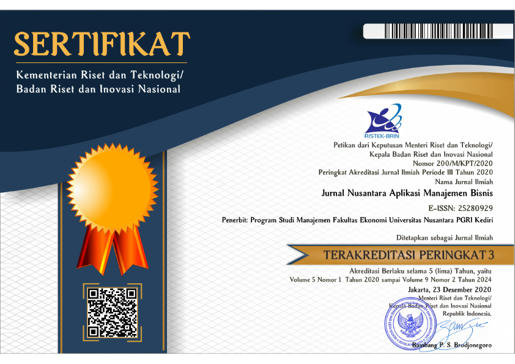Budaya Organisasi Terhadap Kepuasan Kerja Pegawai Dimediasi Motivasi
DOI:
https://doi.org/10.29407/nusamba.v9i2.19065Keywords:
Organizational Culture, Motivation, Job SatisfactionAbstract
Research aims: This study investigates the effect of organizational culture on job satisfaction, which is mediated by motivation.
Design/ Method/ Approach: The data is analyzed with path analysis through Partial Least Square and processed with Smart PLS software.
Research Findings: The results of the study show that organizational culture and motivation have a positive effect on job satisfaction,
Theoretical Contribution/ Originality: This research enriches the understanding that awareness of organizational culture can increase the willingness to behave voluntarily in the workplace, generating motivation and job satisfaction. Although motivation is not the only cause of job satisfaction, when budget constraints reduce employee income, motivation is the most important factor and quickly results in job satisfaction.
Practical Implications: Organizational culture is applied to help work processes and achieve organizational targets. Strong synergy between employees needs to be used as a force to produce job satisfaction, even though they are in a situation of limited budgets
Research Limitations: The limitation of this research is only one mediating variable, the variable of motivation
Downloads
References
Suseno, Kirana KC, Lukitaningsih A. Analisis Budaya Organisasi, Kompensasi, Dan Disiplin Kerja Terhadap Organizational Citizenship Behavior ( OCB ) Melalui Motivasi Sebagai Variabel Moderasi. Jurnal Nusantara Aplikasi Manajemen Bisnis 2021;6:269–82. https://doi.org/https://doi.org/10.29407/nusamba.v6i2.16005.
Djoemadi FR, Setiawan M, Noermijati N, Irawanto DW. The effect of work satisfaction on employee engagement. Polish Journal of Management Studies 2019;19:101–11. https://doi.org/10.17512/pjms.2019.19.2.08.
Rai A, Budhathoki PB, Rai CK. Linkage between satisfaction with colleagues, promotion, nature of work, and three-dimensional organizational commitment. Problems and Perspectives in Management 2021;19:127–36. https://doi.org/10.21511/ppm.19(1).2021.11.
Riyanto S, Endri E, Herlisha N. Effect of work motivation and job satisfaction on employee performance: Mediating role of employee engagement. Problems and Perspectives in Management 2021;19:162–74. https://doi.org/10.21511/ppm.19(3).2021.14.
Dos-Santos JV, Gonçalves G. Organizational Culture, Internal Marketing, and Perceived Organizational Support in Portuguese Higher Education Institutions. Journal of Work and Organizational Psychology 2018;34:38–45. https://doi.org/https://doi.org/10.5093/jwop2018a5.
Suong HTT. Relations of public service motivation and job performance, evidence from vietnam. Polish Journal of Management Studies 2021;23:385–402. https://doi.org/10.17512/pjms.2021.23.1.24.
Stacho Z, Stachová K, Hudáková M, Stasiak-Betlejewska R. Employee adaptation as key activity in human resource management upon implementing and maintaining desired organisational culture. Serbian Journal of Management 2017;12:305–15. https://doi.org/10.5937/sjm12-10340.
Al-Madadha A, Al-Adwan AS, Zakzouk FA. Organisational Culture and Organisational Citizenship Behaviour: The Dark Side of Organisational Politics. Organizacija 2021;54:36–48. https://doi.org/10.2478/orga-2021-0003.
Espinar Redondo R, Ortega Martín JL. Motivation: The Road to Successful Learning. PROFILE Issues in Teachers’ Professional Development 2015;17:125–36. https://doi.org/10.15446/profile.v17n2.50563.
Duha T. Motivasi Untuk Kinerja. 1st ed. Yogyakarta: Deepublish; 2020.
Gautam O, Agrawal P. Truancy and job satisfaction among dual career couples towards organizational sponsored day care amenities in developing nation. Serbian Journal of Management 2020;15:101–13. https://doi.org/10.5937/SJM15-15490.
Abd Razak MR, Ismail A. The Mediating Effects of Procedural Justice on the Relationship between Performance-based Remuneration Management and Job Satisfaction. Jurnal Pengurusan 2018;52:85–101.
Christy Y, Natalia M, Setiana S, Anthony R. Pengaruh Partisipasi Anggaran Terhadap Kinerja Manajerial Dengan Komitmen Organisasi Dan Motivasi Kerja Sebagai Variabel Moderasi. Jurnal Nusantara Aplikasi Manajemen Bisnis 2021;6:149–65. https://doi.org/https://doi.org/10.29407/nusamba.v6i2.16273 Informasi.
Živković S, Ivanovab T. Organizational culture as one of the main factors for the successful safety management. Serbian Journal of Management 2016;11:69–80. https://doi.org/10.5937/sjm11-7990.
Ramadista RMP, Kismono G. The effect of the degree of misfit between human resources management practices and the types of organizational culture on organizational performance. Gadjah Mada International Journal of Business 2020;22:301–22. https://doi.org/10.22146/gamaijb.56583.
Setyawan A, Nelson A. The Role of Organizational Culture in the Influence of HR Practices, Knowledge Management, and Talent Management on Organizational Performance. Jurnal Dinamika Manajemen 2021;2:275–84. https://doi.org/10.18848/1447-9524/cgp/v10i01/59155.
Andjarwati T, Susilo KE, Audah AK. Predictors of job satisfaction in non-profit organizations. Polish Journal of Management Studies 2019;20:19–28. https://doi.org/10.17512/pjms.2019.20.1.02.
Janovac T, Virijević Jovanović S, Tadić J, Tomić G, Ćufalić S. The influence of employee motivation factors on job satisfaction in mining companies. Polish Journal of Management Studies 2021;23:224–38. https://doi.org/10.17512/pjms.2021.23.1.14.
Albalawi AS, Naugton S, Elayan MB, Sleimi MT. Perceived Organizational Support, Alternative Job Opportunity, Organizational Commitment, Job Satisfaction and Turnover Intention: A Moderated-mediated Model. Organizacija 2019;52:310–24. https://doi.org/10.2478/orga-2019-0019.
Riduwan. Metode dan Teknik Menyusun Skripsi, Cetakan ke-11. 11th ed. Bandung: Penerbit Alfabeta; 2018.
Sholihin M, Ratmono D. Analisis SEM-PLS dengan WarpPLS 3.0 Untuk Hubungan NonLinier dalam Penelitian Sosial dan Bisnis. Yogyakarta: C.V ANDI Offset (Penerbit Andi); 2013.
Ghozali I, Latan H. PARTIAL LEAST SQUARES Konsep, Teknik dan Aplikasi Menggunakan Program SmartPLS 3.0 Untuk Penelitian Empiris. 2nd ed. Semarang: Badan Penerbit - Undip; 2015.
Lamers M, Bremer M. Organizatonal culture assessment instrument: Company X. 2019.
Tanuwibowo MH, Setiawan R. Kinerja Karyawan Pada Pt Lestari Purnama Perkasa. Agora 2015;3:60–9.
Tasios T, Giannouli V. Job Descriptive Index (JDI): Reliability and validity study in Greece. Archives of Assessment Psychology 2017;7:31–61.
Abdillah W, Hartono J. PARTIAL LEAST SQUARES (PLS) Alternatif Structura Equation Modeling (SEM) daam Penelitian Bisnis. 1st ed. Yogyakarta: Penerbit Andi; 2015.
Khan WA, Hassan RA, Wafa SA, Arshad MZ. Does innovation affect the firm performance in developing countries? A conceptual framework. Jurnal Pengurusan 2020;59:117–27. https://doi.org/10.17576/pengurusan-2020-59-11.
Azanza G, Moriano JA, Molero F. Authentic leadership and organizational culture as drivers of employees’ job satisfaction. Journal of Work and Organizational Psychology 2013;29:45–50. https://doi.org/http://dx.doi.org/10.5093/tr2013a7.
Basit AA, Arshad R. The Role of Needs-Supplies Fit and Job Satisfaction in Predicting Employee Engagement. Jurnal Pengurusan 2016;47:3–13.
Pujol-Cols L, Lazzaro-Salazar M. Psychosocial risks and job satisfaction in Argentinian scholars: Exploring the moderating role of work engagement. Journal of Work and Organizational Psychology 2018;34:145–56. https://doi.org/10.5093/jwop2018a17.
Rozman M, Grinkevich A, Tominc P. Occupational Stress, Symptoms of Burnout in the Workplace and Work Satisfaction of the Age-diverse Employees. Organizacija 2019;52:46–59. https://doi.org/10.2478/orga-2019-0005.
Martinez IM, Salanova M, Cruz-Ortiz V. Our Boss is a Good Boss! Cross-level Effects of Transformational Leadership on Work Engagement in Service Jobs. Revista de Psicologia Del Trabajo Y de Las Organizaciones 2020;36:87–94. https://doi.org/10.5093/jwop2020a10.
Downloads
Published
Issue
Section
License
Authors who publish with this journal agree to the following terms:
- Copyright on any article is retained by the author(s).
- The author grants the journal, the right of first publication with the work simultaneously licensed under a Creative Commons Attribution License that allows others to share the work with an acknowledgment of the work’s authorship and initial publication in this journal.
- Authors are able to enter into separate, additional contractual arrangements for the non-exclusive distribution of the journal’s published version of the work (e.g., post it to an institutional repository or publish it in a book), with an acknowledgment of its initial publication in this journal.
- Authors are permitted and encouraged to post their work online (e.g., in institutional repositories or on their website) prior to and during the submission process, as it can lead to productive exchanges, as well as earlier and greater citation of published work.
- The article and any associated published material is distributed under the Creative Commons Attribution-ShareAlike 4.0 International License












